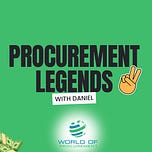Subscribe to our YouTube Channel: https://www.youtube.com/@WorldofProcurement
Most Important Ideas/Facts:
1. Contract Lifecycle Management (CLM):
Definition: CLM is defined as "the process of overseeing a contract from its initial drafting all the way through to its completion or renewal." This includes everything from defining terms to monitoring performance.
Goal: Effective CLM ensures contracts deliver the promised value and minimize potential issues.
2. Pre-Signature Phase: Building a Strong Foundation
Focus: This phase emphasizes meticulous preparation to establish a robust contract framework.
Key Activities:Needs Assessment: Clearly define organizational needs and objectives, ensuring the contract reflects these requirements.
Drafting and Negotiation: Outline key clauses (pricing, timelines, liability, confidentiality) and negotiate terms to avoid future misunderstandings. Legal team involvement is crucial.
Risk Assessment: Identify and mitigate potential risks through specific contract clauses (e.g., penalties for non-performance).
Approvals: Secure necessary approvals from stakeholders (legal, finance, procurement, leadership) to ensure alignment and reduce disputes.
Quote: "By defining needs, carefully drafting terms, assessing risks, and securing approvals, you’re setting up a contract that’s structured to meet both parties' expectations and reduce potential issues."
3. Post-Signature Phase: Managing the Contract in Action
Focus: This phase shifts to active contract management, ensuring adherence and maximizing contract value.
Key Activities:Obligation Management: Track and manage both parties' obligations (deliverables, reports, etc.) as per contract terms.
Performance Monitoring: Monitor supplier's adherence to service levels and deliverables, taking corrective action if needed.
Risk Management: Continuously assess and manage evolving risks that might impact contract performance (e.g., supplier financial stability).
Compliance and Reporting: Ensure adherence to contract terms and regulatory requirements, conducting regular compliance checks and audits.
Renewal or Termination: Evaluate contract performance and organizational needs to decide whether to renew, renegotiate, or terminate upon expiration.
Quote: "The post-signature phase is all about execution and monitoring. This phase ensures that the contract remains valuable to the organization and that any issues are addressed promptly to maintain a strong supplier relationship."












Share this post